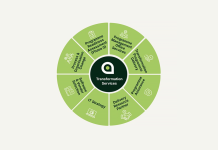Ash Finnegan, digital transformation officer at Conga, discusses how digital transformation will enable healthcare companies to improve patient care and scale their response to the current pandemic
Healthcare organisations are on the frontline of the current coronavirus pandemic. As such, they are having to evolve and change, with greater urgency than ever before. This requires finding new and more effective ways to operate. Manual processes are currently holding the industry back by adding unnecessary risk, limiting the ability to scale to meet increasingly demanding needs and, most importantly, taking the focus away from where it is needed the most – on patients and members. As such, the healthcare industry must digitally transform to overcome the challenges that existing manual processes and systems are not able to solve.
Challenges facing the healthcare industry
As the healthcare industry faces changing dynamics, this presents a number of challenges that existing processes and systems are not able to solve. They need to create new efficiencies, cost savings, better compliance, and improve patient care and communication.
Each area of the industry is facing its own set of challenges. For example, healthcare providers and payers need to accelerate processes and business operations to deal with the competition in the market, while providing better quality patient care. Healthcare institutions are focused on improving patient care experience, managing, and processing health information, and staying secure, private, and compliant. However, life sciences companies are on a quest to manage costs, form innovative partnerships, enhance customer engagement, and stay ahead of changing regulatory requirements as part of the shifting landscape.
With the right set of digital transformation solutions, healthcare organisations can leave behind manual processes to improve patient care and scale their response to the current pandemic. So how is the industry digitally transforming and what technologies are deemed critical to their digital journey?
Healthcare providers
Healthcare providers often manage patient care through multiple manual systems. In a role that’s manual and paperwork-heavy, providers need a solution that allows them to spend more time on creating a patient-first experience, rather than chasing down paperwork and juggling multiple systems. Now that the UK Government is investing in replacing patients’ paper medical records with electronic health records (EHRs), healthcare providers can integrate EHR and CRM data to engage patients on any device and collaborate across the entire healthcare network.
With an integrated system, providers will have a 360-degree view of the patient, as well as the ability to deliver truly personalised experiences. And with digital document solutions, healthcare providers can streamline patient enrolment and onboarding, while maintaining compliance and privacy. In addition, healthcare providers can virtually generate patient health documents automatically. For private healthcare organisations, they can negotiate contracts and physician-provider agreements digitally, then approve and securely sign them.
Life sciences – pharmaceuticals
In the pharmaceutical industry, an accelerated time-to-market of new treatments and drugs is critical, especially during a time where the world is racing towards a vaccine and effective treatments for COVID-19. Pharmaceutical companies need a streamlined way to distribute critical drug information to the right recipients at the right time, all while ensuring their sales teams are working as effectively as possible.
An integrated CRM solution increases efficiency by connecting supply chain, manufacturing, medical affairs, marketing, sales, and patient services, creating a unified provider-patient-partner experience with insights into each part of the process. Combine this with digital document technology and pharmaceutical companies can produce branded trial, treatment, outcome, and sales documents through automated process workflows.
Pharmaceutical companies have also found opportunities to accelerate their clinical trial programmes through digital transformation. Indeed, they often find that a significant bottleneck in their trials is contracting. Contracting with healthcare institutions to carry out company-sponsored clinical trials is known industry-wide as the number one cause of delays.
Life sciences – medical device companies
In an industry where innovation is essential to success, medical device companies are still relying on manual, outdated sales processes to get their products into the hands of medical professionals. A more streamlined, low-touch process is needed now more than ever, as in-person contact is limited in response to the coronavirus pandemic.
Medical device companies need more advanced technology to gain insights, track activities, close deals, and connect all points of the customer lifecycle, including business operations and patient services. An integrated CRM solution will securely connect all sources of data from existing systems to deliver a unified, compliant, and efficient provider, patient, and partner experience on preferred channels. Combined with a digital document solution, medical device organisations can streamline field quotes, proposals, and contracts while maintaining strict compliance and storing all documents within a secure cloud environment.
It is time to digitally transform
In the healthcare industry, nothing is more important than a strong, trusting relationship between patients and providers. With digital transformation technologies, healthcare organisation will not only create time and cost efficiencies, but they will also build a transparent environment where all involved parties feel informed and in control of their healthcare journey.











